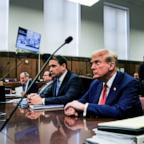Six-Party Summit on North Korea: Don't Expect a Breakthrough Anytime Soon
BEIJING, Dec. 19, 2006 — -- The day begins with reporters huddled in subfreezing temperatures outside the imposing gates of Diaoyutai Guest House as the diplomatic limousines with blackened windows whisk the delegations in or out of the six-nation summit on nuclear negotiations with North Korea.
Then, it's across town to the ornate lobby of the St. Regis Hotel, where reporters are corralled behind a red velvet rope for hours in hopes of a morsel of news from a passing delegate.
U.S. Assistant Secretary of State Christopher Hill has been the most forthcoming and the biggest crowd pleaser so far. His demeanor is relaxed, calm and patient, showing no signs of exasperation -- quite an accomplishment when negotiating with the tough North Korean delegation.
When Hill tells reporters that U.S. patience is running out, it sounds less like a threat than a bit of wise council for an adversary.
"The supply of our patience may have exceeded the international demand for that patience," he said. "We should be patient by picking up the pace and working faster."
Not afraid to show a sense of humor, Hill added, "I don't plan to spend Christmas here."
No one was surprised that the first day of talks was dominated by North Korean defiance and bluster.
As expected, North Korea's chief negotiator, Kim Kye-Gwan, said his country had joined the exclusive nuclear club and expected to receive the world's respect. The only way the North will consider stepping back from its nuclear program will be if the following happens: the United Nations lifts all sanctions, the United States ends its freeze of North Korean financial assets at its principal bank in Macau and the Americans end their threats and hostility against the Democratic People's Republic of Korea (DPRK).
If all those demands sound familiar, they should. In September 2005, at an earlier round of these six-party talks, North Korea agreed to abandon its nuclear program in exchange for financial aid and security guarantees from the United States. That agreement was called the "September 2005 Joint Statement."




